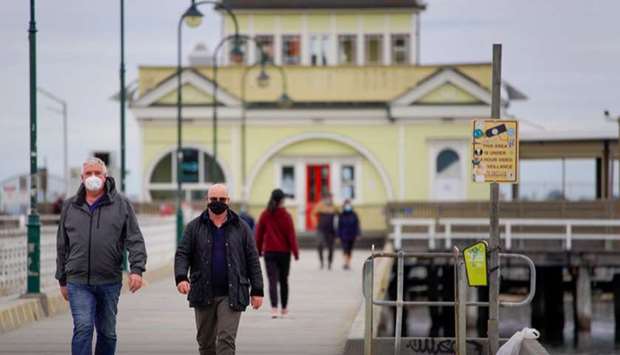Australia’s city of Melbourne, its hotspot in the second wave of coronavirus infections, is on track to return to near normal by Christmas, strengthening hopes for major summer sporting events to go ahead amid a general economic revival.
Southeastern Victoria state recorded a single digit rise in new cases for the first time in three months today, with the lifting of some of the toughest curbs its capital of Melbourne, such as a night-time curfew, Premier Daniel Andrews said.
“That is a very, very significant set of numbers. We are well ahead of schedule,” Andrews told a daily news conference, anticipating a move to “Covid normal”, with most curbs eased.
However, he urged people to stick to strict social distancing rules, despite the rigours of an eight-week-old lockdown to limit the second wave.
“If people don’t do the right thing in the final few weeks of the lockdown, or if they lie about where they’ve been, there’s no Covid-normal Christmas,” he said.
Stringent rules in Australia’s second most populous state have proved divisive, with some provoking criticism from businesses, protest groups and even federal authorities.
Victoria announced changes to its “triggers” to determine further easing after announcing an immediate end to nightly curfews and possible advancement of the next round of such easing by a week, to Oct. 19.
The latest relaxation allowed 127,000 people to return to work on Monday, at manufacturing and food processing industries among others, offering a boost to the hard-hit economy.
But Melbourne retained strict curbs on where people can go and ordered a fine of nearly A$5,000 ($3,527) for those flouting limits on gatherings to two households in an outside space.
Victoria reported just five new virus cases and three deaths in the past 24 hours, down from a daily tally that topped 700 in early August.
The most populous state of New South Wales reported on Monday its second consecutive day without a virus case in more than three months, as did the northeastern state of Queensland.
Andrews said the downward trend in new infections bodes well for summer sporting events, such as the annual Boxing Day cricket test match and the Australian Open tennis tournament.
“What I can say, though, is, if we all stay the course and we continue to see these numbers down, that it becomes more possible to have a crowd of some size,” Andrews said.

